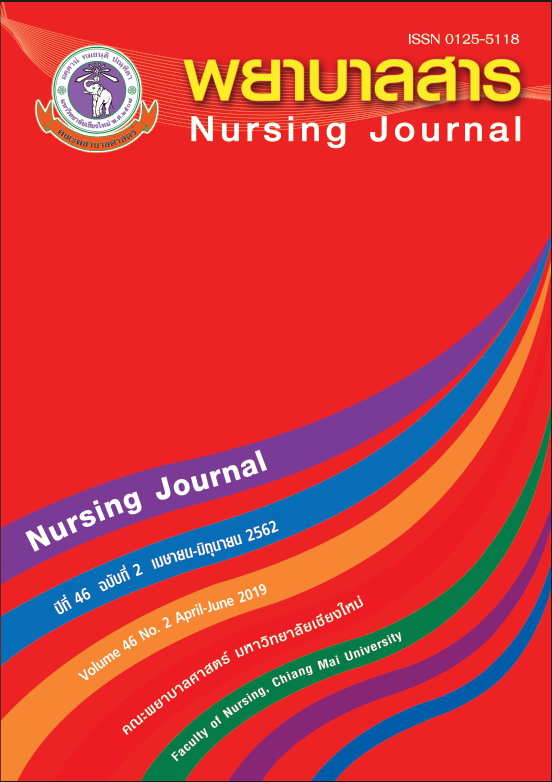The Relationships Between the Participatory Management Work Empowerment, and the Effectiveness of Patient Unit as Perceived by First – Line Nurse Managers, Private Hospitals
Keywords:
Participatory management, work Empowerment, Effectiveness of patient unitAbstract
The purpose of this quantitative study was to investigate the relationship between participatory management, and work empowerment and effectiveness of patient unit as perceived by first–line nurse managers in private hospitals. The target population was 100 first-line nurse managers. Data were collected using a questionnaire consisting of 4 parts: general information, participatory management, work empowerment, and effectiveness of patient unit as perceived by first–line nurse managers. The content validity was 1 and the Cronbach’ a alpha coefficients of reliability were 0.97, 0.95 and 0.97. Data were analyzed using descriptive statistics: percentage, frequency, mean and standard deviation and inferential statistics: Pearson’s product moment correlation. The study found the following:
Overall, participatory management of first line nurse managers was at a high level ( = 3.97, SD = 0.51), overall work empowerment was at a high level ( = 3.83, SD = 0.50), and overall effectiveness of patient unit was at a high level ( =3.70, SD = 0.50). Analysis of relationships between variables revealed that participatory management had a positive and significantly high relationship (r = .710, p < .05) with effectiveness of Patient Unit as perceived by first-line nurse managers, and the relationship between work empowerment and effectiveness of Patient Unit as perceived by first-line nurse managers was also positively and significantly high (r = .732, p < .05)
It is therefore recommended that the participative management support the development of first-line nurse managers through work empowerment trainings outside the organization, in order to gain additional insight and knowledge on organizational development. Also, the management should promote the retention of employees, maintain appropriate staffing and workload and provide reasonable compensation. In return, personnel may exhibit utmost commitment and cooperation to the organization and provideeffective care for the wellbeing of patients.
References
New York : South – Western College.
Chansong, N. and Intararak, S. (2561). “Participatory Management of School Clusters for
Efficiency Promotion of Provincial Secondary Education Managemen”. Suan dusit
Graduate Scholl Acandemic journal, 14(1), 115-13.(In Thai)
Finkelman, C.E. (2001). Hospital RNs’ job satisfactions and dissatisfactions. Journal of
Nursing Administration, 31(11), 324-31.
Kinicki A., Kreitner R. (2008). Organizational behavior key concept, skill and best practice.
3rd ed. New York : McGraw – Hill,
Laschinger HKS, Wong C. Leader. (1999). “behaviorimpact on staff nurse empowerment,job
tension, and work effectiveness”. Journal of Nursing Administration1999, 29(5),
28-39.
Promsaart, U. (2012). "An Empowerment Of work Influencing The Job Competency Of
Registered Nurse Private Hospital, Bangkok Metropolis. Jurnal of Public Health,
42(2), 92-105. (In Thai)
National Statistical Office. (2011). Survey of Hospitals and Services 2012. 1st ed.
Bangkok: Bureau of Statistics. (In Thai)
Sashkin, M. (1982). A manager’s guide to participative management. New York: AMA
Membership Publication Division.
Swansburg, R. C. (1996). Management and Leadership for Nurse Management. Boston ;
Jones and Barrett.
Sensod, C. (2011). Relationships between Participatory Management of head nurse,
Organizational support, and nurse team effectiveness as perceived by staff nurse,
private hospitals, Bangkok metropolis. the Degree of Master of Nursing Science
Program in Nursing Administration Faculty of Nursing Chulalongkorn University. (In
Thai)
Wannaklueng, B. (2012). The Relationships between Duration of Work, Training Experience,
Organizational Climate, and the Participation in Hospital Quality Improvement and
Accreditation of Staff Nurses at Community Hospitals in Chainat Province. the Degree of
Master of Nursing Science in Nursing Administration School of Nursing Sukhothai
Thammathirat Open University. (In Thai)
Downloads
Published
How to Cite
Issue
Section
License
บทความที่ได้รับการตีพิมพ์เป็นลิขสิทธิ์ของวารสารพยาบาลสาร
ข้อความที่ปรากฏในบทความแต่ละเรื่องในวารสารวิชาการเล่มนี้เป็นความคิดเห็นส่วนตัวของผู้เขียนแต่ละท่านไม่เกี่ยวข้องกับมหาวิทยาลัยเชียงใหม่ และคณาจารย์ท่านอื่นๆในมหาวิทยาลัยฯ แต่อย่างใด ความรับผิดชอบองค์ประกอบทั้งหมดของบทความแต่ละเรื่องเป็นของผู้เขียนแต่ละท่าน หากมีความผิดพลาดใด ๆ ผู้เขียนแต่ละท่านจะรับผิดชอบบทความของตนเองแต่ผู้เดียว






